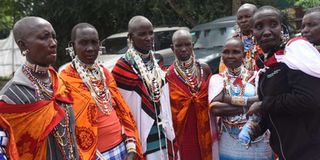Boost for Maa women in fight against FGM

A group of Maasai women at a press conference in Nairobi last year. Maasai women in Kajiado County have been challenged to embrace income earning enterprises to boost the fight against retrogressive cultures affecting girls.
What you need to know:
- Maasai women challenged to embrace income earning enterprises to boost the fight against retrogressive cultures adversely affecting the girl child.
- Lack of economic breakthrough deny them a chance to protect their daughters from FGM and early marriage.
- Government departments in collaboration with local NGOs have introduced income generating enterprises among them indigenous tree planting to boost the women.
Maasai women in Kajiado County have been challenged to embrace income earning enterprises to boost the fight against retrogressive cultures adversely affecting the girl child.
Poverty among polygamous families has been cited as the biggest setback in fight against female gentle mutilation and early marriages in Maasailand.
Women are said to give in to their husbands’ demands to marry off their daughters after forced circumcision.
Ms Agnes Leina, a member of Anti-FGM Board and the director of Ilaramatak, a local NGO, said: “Maasai women depend on their husbands for daily bread. Lack of economic breakthrough deny them a chance to protect their daughters from FGM and early marriage. Some have even become traditionally circumcisers to earn a living.”
Embrace tree planting
Various government departments in collaboration with local NGOs have now introduced several income generating enterprises among them indigenous tree planting to boost the women.
Hundreds of Maasai women from Enkinye village, Kajiado Central have benefited from 2,000 indigenous seedlings.
The women have been urged to embrace tree planting not only for environmental conservation but also as an income generating avenue.
Ms Bernadette Loloju, the chief executive of the anti-FGM board, said care for environment go hand in hand with anti-FGM campaign considering that poverty attributed to environmental degradation mostly affects the female gender. “We will not relent in empowering women economically to give them a voice against retrogressive cultures,” said Ms Loloju.





